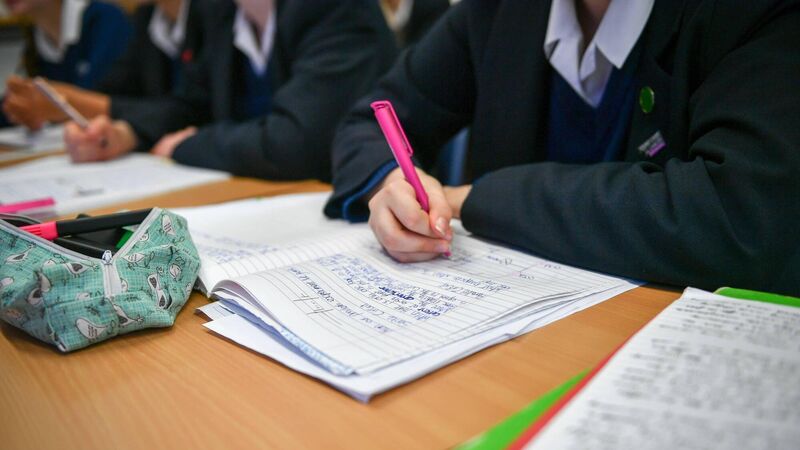Leaving Cert Q&A: What if I am unhappy with my calculated grades?

Calculated grades for the Leaving Certificate went through four different stages. File picture
Some 60,000 Leaving Cert students got their results this morning.
These results - the highest on record - came at the end of a turbulent and difficult year, with the class of 2020 experiencing a Leaving Cert unlike any other.
For many, thoughts are now turning to what it all means and what happens next.
Expert Mariel Twomey, guidance counsellor and member of the Institute of Guidance Counsellors (IGC), answers your questions about Leaving Cert 2020.
The appeals process this year is different to other years as it will only look if the information has been submitted correctly and will not look at how the calculated mark by the teacher was come to. So it is different from other years.
Currently the government guidelines on the appeals process is that if you are still unhappy with the outcome of the appeal you will have the option of sitting the exams in November. They have not indicated if the results will be reduced.
Firstly don’t panic. There are a number of options available. The student can look at appealing to see if the data has been imputed correctly.
Secondly wait for the CAO offers to come out and see what course she is offered.
If she is still not happy she should look at applying to a PLC course that is in the area that she wants to study as this would give her another option to progress through to third level.
Or she could sit the exams in November 2020.
If the student is up taking a deferred place the points won’t matter even if they increased.
Also because the government has added extra places this might help with the points increase, it won’t be evident until the CAO offers come out on September 11 so don’t panic just wait and you will be able to reflect on the outcome of the CAO at that juncture.
It is difficult to estimate the change to a particular course.
Given that the grades have increased across the board it is likely that the points for a particular course may go up, but the points are set by supply and demand for the course.
The government has introduced extra college places this year in high demand courses and we will have to wait for the CAO process to see the effect this will have on the points.
No, a number of places are still available.
Many of the interviews are taking place currently but log on to the website of plc college and apply online this week for the course you are interested in.
Yes, you can use these results to reapply next year 2021/2022. You can also combine scores from sitting the written exam in November (your best six from calculated grades and written exam grades will be combined for points score.)
If you really want pharmacy, it may be worth considering sitting the Leaving Certificate exam in November in the hopes that your grades will increase and you will be offered pharmacy for 2021/22 if you get the required amount of points.
A number of students may choose to repeat the leaving Certificate outright.
Another option is to undertake an undergraduate course in a related area, such as chemical science, and then take the graduate entry option to progress into pharmacy. This is a longer road but is an option that could be considered also.
Depending on the course you are applying for, some do not require maths for matriculation for example Arts in UCC don’t have maths for matriculation.A number of the colleges offer a maths exam for courses that need maths for matriculation, for example engineering in CIT, so this is another option.The option of sitting the Leaving Certificate maths exam in November is also available.Also you could look at the vacant places list on the CAO website. These are courses with places available after the offers have been accepted.
This year is unique in that you will have the option of sitting the Leaving Certificate in November if you were not happy with a particular grade. Also, the viewing of grades will be available, and if you feel the information was not inputted correctly you will be able to appeal the calculated grades also. [Appeals will be confined to checking if data was downloaded and transferred correctly.] So in short, there are two options available to a student that is not happy with results or a particular subject result; They can appeal the calculated grade, and if their result doesn’t change they will be able to sit the exam in November to see if they can improve on their result. They will be able to combine their best results from the Leaving Certificate exam in November and their calculated grades received.
The option of applying to a PLC or an apprenticeship or for a vacant place through the CAO is also an option.
Calculated grades went through four different stages. Students were assigned estimated marks and a class ranking by their teachers. This went through a process of in-school alignment and this data was then signed off on by the student’s principal before it was sent to the Department of Education. Here, the data was subject to standardisation, which the department believes was necessary to ensure that all students are treated equitably. According to the department, it was an iterative process and, eventually, the data was processed through 13 different steps. This was then validated for accuracy.
Data relating to a school’s track record in the Leaving Certificate was removed from the process last week. This followed fears that ‘school profiling’ or a ‘postcode lottery’ would lead to students in disadvantaged schools being negatively impacted. Some historical school data was still used, however. A statistical model was built based on data from the junior cycle in 2017, 2018, and 2019. This showed how any particular student was likely to perform in any given Leaving Certificate exam in a particular subject, at a particular level. This was then mapped along with school estimates. The junior cycle data provided a means of predicting the pattern of performance, according to the department.
Grade inflation is "a real or perceived upward trend in the average grades awarded to students for a particular level of academic achievement".
This year saw higher grades across the board. The Department of Education has acknowledged it placed a higher priority on fairness for students, following an unprecedented year, over eliminating the phenomena, as it would in previous years. Results this year would have been more in line with what we would have seen in previous years if a school’s track record in the Leaving Certificate exams had been kept as a factor in its calculations.
No. Gender or socioeconomic status, or a school's DEIS status were not factors in determining calculated grades. The model used was a 'blind model'. According to the Department of Education, results were then checked against these characteristics to make sure that trends were broadly in line with previous years, or that these groups weren't disadvantaged or advantaged disproportionately.
Some of the confusion from this is likely to have arisen via a parliamentary question this summer, which said the use of demographic characteristics was "inherent" in the design of the statistical model.
If you are unhappy with your calculated grades, you have a couple of options. Appeals open next Monday, September 14, and at that time you will also be able to access your estimated score. Appeals are limited to checking that data was entered and downloaded correctly.
If you see a major discrepancy in the marks you received, you should consider appealing it. You also have the option to have the process reviewed by independent appeal scrutineers. If you are still unhappy, you can opt to sit the exams, planned for November. A student’s highest results will count towards their college entry, however it will be too late to get an offer of a college place for this academic year.





